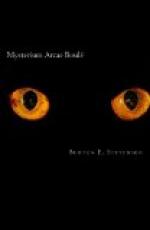“We were at a loss to understand Crochard’s connection with Drouet,” M. Pigot continued. “Drouet, while a mere hanger-on of the cafes of the boulevards, was not a criminal. Then came the death of that creature Morel, in an effort to gain possession of this cabinet, and we began to understand. We made inquiries concerning the cabinet; we learned its history, and the secret of its construction, and we arrived at a certain conclusion. It was to ascertain if that conclusion is correct that I came to America.”
“What is the conclusion?” queried Grady, who had listened to all this with a manifest impatience in strong contrast to my own absorbed interest.
For I had already guessed what the conclusion was, and my pulses were bounding with excitement. “Our theory,” replied M. Pigot, without the slightest acceleration of speech, “is that the Michaelovitch diamonds are concealed in this cabinet. Everything points to it—and we shall soon see.” As he spoke, he drew from his pocket a steel gauntlet, marvellously like the one Godfrey had used, and slipped it over his right hand. “When one attempts to fathom the secrets of L’Invincible” he said with a smile, “one must go armoured. Already three men have paid with their lives the penalty of their rashness.” “Three men!” repeated Grady, wonderingly. “Three,” and Pigot checked them off upon his fingers. “First the man who gave his name as d’Aurelle, but who was really a blackmailer named Drouet; second, M. Vantine, the connoisseur; and third, the creature Morel. Of these, the only one that really matters is M. Vantine; his death was most unfortunate, and I am sure that Crochard regrets it exceedingly. He might also regret my death, but, at any rate, I have no wish to be the fourth. Not I,” and he adjusted the gauntlet carefully. “One moment, monsieur,” I said, bursting in, unable to remain longer silent. “This is all so wonderful—so thrilling—will you not tell us more? For what were these three men searching? For the jewels?” “Monsieur is as familiar with the facts as I,” he answered, in a sarcastic tone. “He knows that Drouet was killed while searching for a packet of letters, which would have compromised most seriously a great lady; he knows that M. Vantine was killed while endeavouring to open the drawer after its secret had been revealed to him by the maid of that same great lady, who was hoping to get a reward for them; Morel met death directly at the hands of Crochard because he was a traitor and deserved it.” More and more fascinated, I stared at him. What secret was safe, I asked myself, from this astonishing man? Or was he merely piecing together the whole story from such fragments as he knew? “But even yet,” I stammered, “I do not understand. We have opened the secret drawer of the cabinet—there was no poison. How could it have killed Drouet and Mr. Vantine?”




